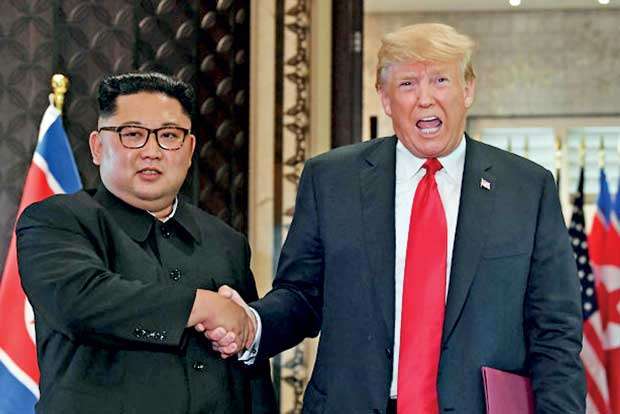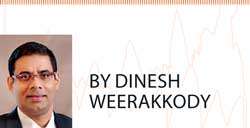27 Jun 2018 - {{hitsCtrl.values.hits}}

 US President Donald Trump is repeatedly boasting about his success in negotiating with North Korea. For decades and through many administrations, every leader said that peace and denuclearization of the Korean Peninsula were not even small possibilities.
US President Donald Trump is repeatedly boasting about his success in negotiating with North Korea. For decades and through many administrations, every leader said that peace and denuclearization of the Korean Peninsula were not even small possibilities.
Trump may be twice as old as the North Korean leader Kim Jong Un and 20 years older than the French and Canadian leaders and a man who had failed to demonstrate much diplomatic technique as President, was able to boost most major markets with his straight talk. Most Asian markets closed higher after the landmark meeting between Trump and Kim took place in Singapore.
The high-profile Trump-Kim summit — the first meeting between the sitting leaders of both countries — took centre stage during the day world over. Although analysts said they expected little direct impact from the event on the markets and no major breakthroughs came about from the meeting, the meeting culminated in both leaders signing a statement that pledged a lasting peace regime in the Korean Peninsula.
Aside from the photo opportunities, from a financial markets perspective, the dollar became firmer despite the lack of certainty over what was achieved. The greenback edged up almost 0.3 percent against the yen to trade at 110.33 at 3:00 p.m. on that day. The dollar continues to hold, despite the rhetoric.
Trump diplomacy
Generally relations between nations are not just expressed by how well the leaders get on. They are based also on state-to-state engagement, the institutional links and shared values and experience that live on long beyond any leader’s term of office.
But Trump policy of isolationism has left a giant vacuum around the world. As a result, the world is full of leaders that decide who they want to deal with or not. Relations are now based 100 percent on their commercial interest.
For example, Saudi King Salman last year kicked off a multi-nation month-long trip to Asia aimed at boosting economic ties with Asia. It was King Salman’s first visit to Asia since he took the throne in January 2015. The last Saudi monarch to visit was his predecessor, King Abdullah, who visited in 2006.
The king’s visit strengthened ties between major Asian countries. The monarch’s tour included Malaysia, Indonesia, Brunei, Japan, China and finally the Maldives, to finalize a multibillion dollar investment including a US dollar grant.
Saudi Arabia is the world’s largest oil exporter, with much of its crude destined for customers in Asia.
As to why the super rich Saudi King Salman, accompanied by an entourage that numbered up to 1,500, 459 tonnes of luggage and equipment, did not plan a stopover in Sri Lanka en route to the Maldives, only the Foreign Ministry would know - but what a missed opportunity for Sri Lanka!
Diplomacy
We regularly hear our politicians saying diplomacy plays a direct role in addressing the root cause of insecurity and that good diplomatic initiatives help to build partnerships so that Sri Lanka can work together with the world to address some of our thorny bilateral and multilateral issues.
To play that role effectively, they also say Sri Lanka needs competent officials. But despite that, we still post officials to important markets with no experience what so ever.
Ambassador/high commissioner is the primary representative for all Sri Lankan interests in a foreign country and that varies from being responsible for taking care of Sri Lankan citizens and their needs to issuance of visas, discussions about political and economic and trade and commerce opportunities, military relationships and dealing with environment. It’s technically the whole range of things.
In addition, they must also do public diplomacy. They are expected to give effective speeches at different sorts of events to make sure that people in that country are well aware what our policies are and why we have them.
But when you send people who do not know the subject, not much can be achieved. For example President J.R. Jayewardene in 70s was able to launch a massive infrastructure development project like the Accelerated Mahaweli Development scheme, which provided employment to thousands because of the grant aid he got from the West and at the very worst, concessional aid (as opposed to foreign commercial loans) from the First World countries.
Ambassador appointments
There are really two ways to get appointed as an ambassador or a high commissioner for Sri Lanka. Either through the Foreign Service process where you join as a junior officer and you work your way up through the system. About two-thirds of the ambassadors go through that route. For that, you begin by taking a written test. And then, if you pass that test and get in, you work your way up through the system.
The other way for becoming an ambassador is that the government always chooses a number of ambassadors from its own lists without the Foreign Ministry connection and that’s based upon the people who have assisted the effort to get the president or government elected one way or another or competent people who are well-known to people in the government and they figure that they would do a really good job even though they haven’t gone through the system.
Or some ambassadors have the good fortune to know or be related to somebody who gets elected as the president or foreign minister.
Economic diplomacy
As the Janatha Vimukthi Peramuna has said many times in public, diplomacy is serious business. It refers to communication or negotiation tactics that use political and legal channels to address both bilateral and multilateral issues.
Good diplomacy works at least in four ways: a) protects a nation’s security, b) stops potential threats from becoming real, c) secures a nation’s economic future and d) protects the global environment.
Therefore, the members of the Foreign Service play a crucial role in making the kind of lucrative international connections/agreement possible to help a country to look good and in the pursuit of economic objectives.
Diplomats need to help to set up partnerships and relationships all around the world so that a country can understand the global issues, maintain global competitiveness and capitalize on the opportunities globalization creates. Diplomacy used to be thought of as the quiet, behind-the-scenes, government-to-government communications.
It’s now so much more than that. Therefore, for a country to promote the kinds of economic and trade policies they want around the region and world, a country needs to appoint competent people to build a public case internationally for their policies, values and interests. This will then enable a nation to become a credible and trusted partner, while remaining devoted to their national interests and also promote their economic ties at the same time.
Competent officials
Therefore, given that we have global leaders that openly challenge a rules-based international order and given the economic and socio-political shift, technology disruption that has occurred and need for active international engagement, which is basically leveraged upon the pursuit of economic objectives, the officials appointed to promote Sri Lankan interest abroad should as far as possible be people who have the skill to focus on economic and political diplomacy to secure our core national interest.
The job is not for retired planters, relatives and friends of politicians and advisors, ex-cricketers or fashion models. The service must have a mix of top quality non-career and career diplomats with good academic pedigrees and technocratic mettle, with character and integrity to drive our political and economic agenda.
(Dinesh Weerakkody is a thought leader)
18 Nov 2024 54 minute ago
18 Nov 2024 1 hours ago
18 Nov 2024 1 hours ago
17 Nov 2024 17 Nov 2024
17 Nov 2024 17 Nov 2024